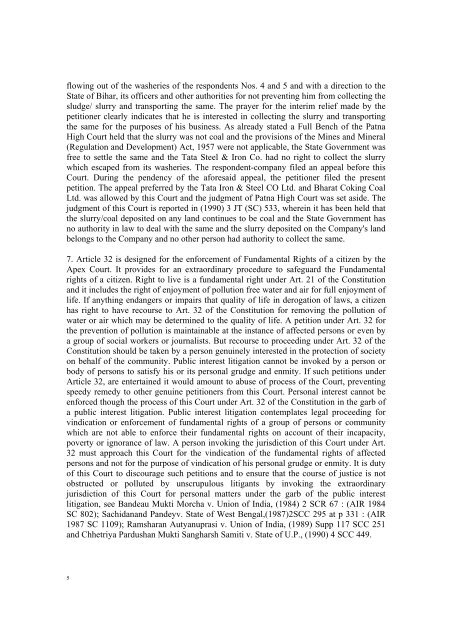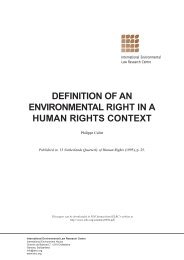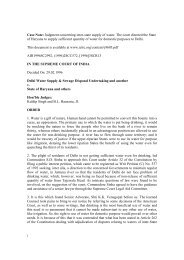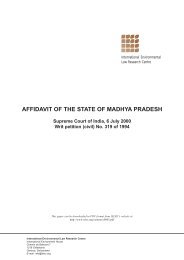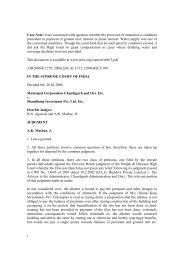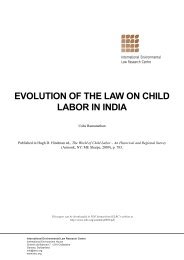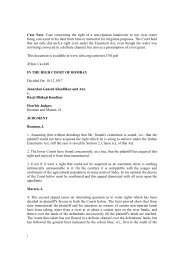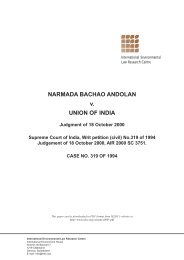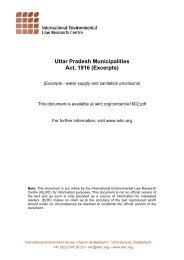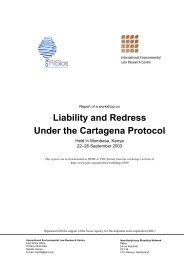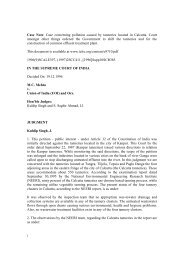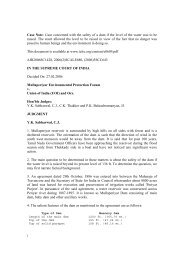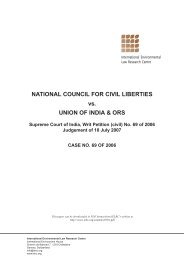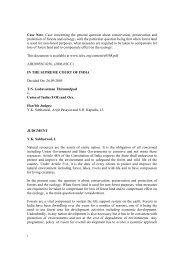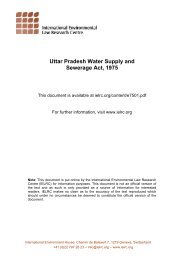Subhash Kumar v. State of Bihar and others, 1991 - International ...
Subhash Kumar v. State of Bihar and others, 1991 - International ...
Subhash Kumar v. State of Bihar and others, 1991 - International ...
Create successful ePaper yourself
Turn your PDF publications into a flip-book with our unique Google optimized e-Paper software.
flowing out <strong>of</strong> the washeries <strong>of</strong> the respondents Nos. 4 <strong>and</strong> 5 <strong>and</strong> with a direction to the<br />
<strong>State</strong> <strong>of</strong> <strong>Bihar</strong>, its <strong>of</strong>ficers <strong>and</strong> other authorities for not preventing him from collecting the<br />
sludge/ slurry <strong>and</strong> transporting the same. The prayer for the interim relief made by the<br />
petitioner clearly indicates that he is interested in collecting the slurry <strong>and</strong> transporting<br />
the same for the purposes <strong>of</strong> his business. As already stated a Full Bench <strong>of</strong> the Patna<br />
High Court held that the slurry was not coal <strong>and</strong> the provisions <strong>of</strong> the Mines <strong>and</strong> Mineral<br />
(Regulation <strong>and</strong> Development) Act, 1957 were not applicable, the <strong>State</strong> Government was<br />
free to settle the same <strong>and</strong> the Tata Steel & Iron Co. had no right to collect the slurry<br />
which escaped from its washeries. The respondent-company filed an appeal before this<br />
Court. During the pendency <strong>of</strong> the aforesaid appeal, the petitioner filed the present<br />
petition. The appeal preferred by the Tata Iron & Steel CO Ltd. <strong>and</strong> Bharat Coking Coal<br />
Ltd. was allowed by this Court <strong>and</strong> the judgment <strong>of</strong> Patna High Court was set aside. The<br />
judgment <strong>of</strong> this Court is reported in (1990) 3 JT (SC) 533, wherein it has been held that<br />
the slurry/coal deposited on any l<strong>and</strong> continues to be coal <strong>and</strong> the <strong>State</strong> Government has<br />
no authority in law to deal with the same <strong>and</strong> the slurry deposited on the Company's l<strong>and</strong><br />
belongs to the Company <strong>and</strong> no other person had authority to collect the same.<br />
7. Article 32 is designed for the enforcement <strong>of</strong> Fundamental Rights <strong>of</strong> a citizen by the<br />
Apex Court. It provides for an extraordinary procedure to safeguard the Fundamental<br />
rights <strong>of</strong> a citizen. Right to live is a fundamental right under Art. 21 <strong>of</strong> the Constitution<br />
<strong>and</strong> it includes the right <strong>of</strong> enjoyment <strong>of</strong> pollution free water <strong>and</strong> air for full enjoyment <strong>of</strong><br />
life. If anything endangers or impairs that quality <strong>of</strong> life in derogation <strong>of</strong> laws, a citizen<br />
has right to have recourse to Art. 32 <strong>of</strong> the Constitution for removing the pollution <strong>of</strong><br />
water or air which may be determined to the quality <strong>of</strong> life. A petition under Art. 32 for<br />
the prevention <strong>of</strong> pollution is maintainable at the instance <strong>of</strong> affected persons or even by<br />
a group <strong>of</strong> social workers or journalists. But recourse to proceeding under Art. 32 <strong>of</strong> the<br />
Constitution should be taken by a person genuinely interested in the protection <strong>of</strong> society<br />
on behalf <strong>of</strong> the community. Public interest litigation cannot be invoked by a person or<br />
body <strong>of</strong> persons to satisfy his or its personal grudge <strong>and</strong> enmity. If such petitions under<br />
Article 32, are entertained it would amount to abuse <strong>of</strong> process <strong>of</strong> the Court, preventing<br />
speedy remedy to other genuine petitioners from this Court. Personal interest cannot be<br />
enforced though the process <strong>of</strong> this Court under Art. 32 <strong>of</strong> the Constitution in the garb <strong>of</strong><br />
a public interest litigation. Public interest litigation contemplates legal proceeding for<br />
vindication or enforcement <strong>of</strong> fundamental rights <strong>of</strong> a group <strong>of</strong> persons or community<br />
which are not able to enforce their fundamental rights on account <strong>of</strong> their incapacity,<br />
poverty or ignorance <strong>of</strong> law. A person invoking the jurisdiction <strong>of</strong> this Court under Art.<br />
32 must approach this Court for the vindication <strong>of</strong> the fundamental rights <strong>of</strong> affected<br />
persons <strong>and</strong> not for the purpose <strong>of</strong> vindication <strong>of</strong> his personal grudge or enmity. It is duty<br />
<strong>of</strong> this Court to discourage such petitions <strong>and</strong> to ensure that the course <strong>of</strong> justice is not<br />
obstructed or polluted by unscrupulous litigants by invoking the extraordinary<br />
jurisdiction <strong>of</strong> this Court for personal matters under the garb <strong>of</strong> the public interest<br />
litigation, see B<strong>and</strong>eau Mukti Morcha v. Union <strong>of</strong> India, (1984) 2 SCR 67 : (AIR 1984<br />
SC 802); Sachidan<strong>and</strong> P<strong>and</strong>eyv. <strong>State</strong> <strong>of</strong> West Bengal,(1987)2SCC 295 at p 331 : (AIR<br />
1987 SC 1109); Ramsharan Autyanuprasi v. Union <strong>of</strong> India, (1989) Supp 117 SCC 251<br />
<strong>and</strong> Chhetriya Pardushan Mukti Sangharsh Samiti v. <strong>State</strong> <strong>of</strong> U.P., (1990) 4 SCC 449.<br />
5


